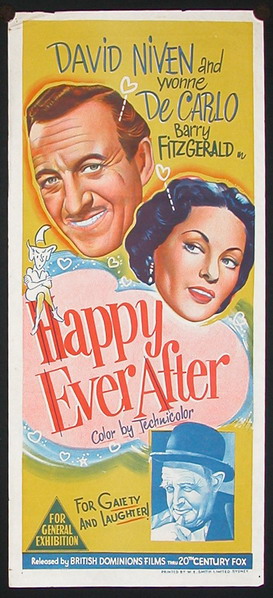
HAPPY EVER AFTER
UK, 1954, 88 minutes, Colour.
David Niven, Yvonne de Carlo, Barry Fitzgerald, George Cole, Robert Urquhart, A.E. Matthews, Joseph Tomelty.
Directed by Mario Zampi.
One of those short light comedies that came from Britain in the early fifties. David Niven is at home in this kind of role and receives interesting and entertaining support from a wide range of cast from Yvonne de Carlo to Barry Fitzgerald. The theme is the Irish and quite a lot of fun is poked at the Irish character and Irish style - all good-naturedly.
Direction is by Italian Mario Zampi who worked in England for a long time and made such comedy classics as Laughter In Paradise.
1. The quality and enjoyment value of this comedy?
2. An example of the fifties comedy made by the British? The traits of comedy: farce, exaggerated characterization, local colour, humorous dialogue? The use of colour for Ireland?
3. The importance of the Irish background? Local colour, the Irish people and their customs, slow moving, preoccupied with moneyp custom etc.? How gentle was the film on the Irish? How accurate in its satire?
4. The theme of change and its effect on the Irish? Their inability to handle it? The humour of this?
5. The change in the administration, the effects of justice and the Irish in their inability to cope with it, especially in terms of repaying money, drinks for all etc.?
5. The impact of the new Squire? David Niven and his English style? The satire on the British and their dominance of the Irish? The fawning attitudes of the Irish, and their reaction to the strict administration of things? What were the best examples of this?
7. The personality of Selina, the outcast and gold-digger, her aiming at the Squire while hurting her flance? Selina as an image of the Squire in his attitudes?
8. The detailed characterization of the villagers? how well did the film do this, for example Barry Fitzgerald, the doctor, the poacher, the men in the hotel etc.?
9. The black comedy in the plans to kill the Squire? The humour in their not working?
10. The humour with the ghosts on the final day? The people being caught in their own plans? The effect on the Squire and Selina?
11. How satisfying was the revelation of the new will, the Squire getting his deserts? the Irish learning their lessons? How preachy was the pointing of this moral?
12. What values about human behaviour, greediness, dominance were explored, how well, even if lightly?
13. What were the prospects for the ending? Were they 'Happy Ever After'?